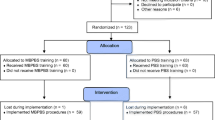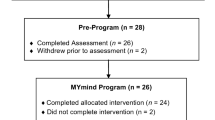Abstract
In an earlier study, we provided mindfulness training to three caregivers of individuals with profound multiple disabilities. We measured levels of happiness displayed by the individuals during the 8 weeks of mindfulness training of the caregivers, as well as during the 16 weeks following the termination of training. We found that happiness increased markedly when an individual interacted with a caregiver who had received training in mindfulness as opposed to a control caregiver who did not receive such training. In this study, we investigated whether the increased mindfulness of the three caregivers would transfer to interactions with their own children. The children’s non-compliance with their mother’s requests was used as an indirect index of the effects of training their mothers received in mindfulness. Although the ages of the children and their baseline levels of non-compliance were variable, the data showed a decrease in non-compliance during mindfulness training of the caregivers and further decreases following the completion of training. Our data provide preliminary evidence of transfer of mindfulness training from caregiving to parent–child interactions. We speculate as to why this may occur in mindfulness training.

Similar content being viewed by others
References
Ajahn Chah, (2002). The collected works of Ajahn Chah. Boston: Wisdom.
Altmaier, E., & Maloney, R. (2007). An initial evaluation of a mindful parenting program. Journal of Clinical Psychology, 63, 1231–1238. doi:10.1002/jclp.20395.
Baer, R. A. (2003). Mindfulness training as a clinical intervention: A conceptual and empirical review. Clinical Psychology: Science and Practice, 10, 125–143. doi:10.1093/clipsy/bpg015.
Baer, R. A. (2006). Mindfulness-based treatment approaches: Clinician’s guide to evidence base and applications. New York: Academic Press.
Barlow, D. H., Nock, M. K., & Hersen, M. (2009). Single case experimental designs: Strategies for studying behavior change. New York: Allyn & Bacon.
Bodhi, B., & Nyahaponika Thera, (1999). Numerical discourses of the Buddha: An anthology of suttas from the Anguttara Nikaya. Walnut Creek, CA: Alta Mira Press.
Coatsworth, J.D., Duncan, L.G., Greenberg, M.T., & Nix, R.L. (2009) Changing parents’ mindfulness, child management skills, and relationship quality with their youth: Results from a randomized pilot intervention trial. Journal of Child and Family Studies (in press).
Duncan, L.G., & Bardacke, N (2009). Mindfulness-based childbirth and parenting education: Promoting family mindfulness in the perinatal period. Journal of Child and Family Studies (in press).
Grossman, P., Niemann, L., Schmidt, S., & Walach, H. (2004). Mindfulness-based stress reduction and health benefits: A meta-analysis. Journal of Psychosomatic Research, 57, 35–43. doi:10.1016/S0022-3999(03)00573-7.
Hanh, T. N. (1991). Peace is every step: The path of mindfulness in everyday life. NY: Bantam Books.
Hick, S. F., & Bien, T. (2008). Mindfulness and the therapeutic relationship. New York: Guilford Press.
Kabat-Zinn, J. (1990). Full catastrophe living: Using the wisdom of your mind to face stress, pain and illness. New York: Dell Publishing.
Kabat-Zinn, J. (1994). Wherever you go, there you are: Mindfulness meditation in everyday life. NY: Hyperion.
Katagiri, D. (2007). Each moment is the universe: Zen and the way of being time. Boston, MA: Shambhala.
Kazdin, A. E. (2008). Behavior modification in applied settings (6th ed.). Long Grove, Ill: Waveland Press, Inc.
Kornfield, J. (2008). The wise heart: A guide to the universal teachings of Buddhist psychology. New York: Bantam.
McLeod, K. (2001). Wake up to your life: Discovering the Buddhist path of attention. San Francisco, CA: Harper Collins.
Miller, L. K. (1997). Principles of everyday behavior analysis (3rd ed.). Pacific Grove, CA: Brooks/Cole Publishing, Inc.
Mitchell, S. (1988). Tao Te Ching. San Francisco, CA: Harper Collins.
Nyanaponika Thera, (1992). The heart of Buddhist meditation. Kandy, Sri Lanka: Buddhist Publication Society.
Patterson, G. R., Reid, J. B., & Dishion, T. J. (1992). A social learning approach: IV. Antisocial boys. Eugene, OR: Castalia.
Sameroff, A. J. (1995). General system theories and developmental psychopathology. In D. Cicchetti & D. J. Cohen (Eds.), Developmental psychopathology. Vol. 1: Theory and methods (pp. 659–695). New York: Wiley.
Schwartz, J. M., & Begley, S. (2002). The mind and the brain: Neuroplasticity and the power of mental force. New York: Harper Collins.
Siegel, D. J. (2007). The mindful brain: Reflection and attunement in the cultivation of well-being. New York: W. W. Norton.
Singh, N. N., Lancioni, G. E., Wahler, R. G., Winton, A. S. W., & Singh, J. (2008). Mindfulness approaches in cognitive behavior therapy. Behavioural and Cognitive Psychotherapy, 36, 659–666. doi:10.1017/S1352465808004827.
Singh, N. N., Lancioni, G. E., Winton, A. S. W., Curtis, W. J., Wahler, R. G., Sabaawi, M., et al. (2006a). Mindful staff increase learning and reduce aggression in adults with developmental disabilities. Research in Developmental Disabilities, 27, 545–558. doi:10.1016/j.ridd.2005.07.002.
Singh, N. N., Lancioni, G. E., Winton, A. S. W., Fisher, B. C., Wahler, R. G., McAleavey, K., et al. (2006b). Mindful parenting decreases aggression, noncompliance, and self-injury in children with autism. Journal of Emotional and Behavioral Disorders, 14, 169–177. doi:10.1177/10634266060140030401.
Singh, N. N., Lancioni, G. E., Winton, A. S. W., Singh, J., Curtis, J. W., Wahler, R. G., et al. (2007). Mindful parenting decreases aggression and increases social behavior in children with profound developmental disabilities. Behavior Modification, 31, 749–771. doi:10.1177/0145445507300924.
Singh, N. N., Lancioni, G. E., Winton, A. S. W., Wahler, R. G., Singh, J., & Sage, M. (2004). Mindful caregiving increases happiness among individuals with multiple disabilities. Research in Developmental Disabilities, 25, 207–218. doi:10.1016/j.ridd.2003.05.001.
Singh, N. N., Winton, A. S. W., Singh, J., McAleavey, K., Wahler, R. G., & Sabaawi, M. (2006c). Mindfulness-based caregiving and support. In J. K. Luiselli (Ed.), Antecedent assessment and intervention: Supporting children and adults with developmental disabilities in community settings (pp. 269–290). Baltimore, MD: Paul H. Brookes.
Stokes, T. F., & Baer, D. M. (1977). An implicit technology of generalization. Journal of Applied Behavior Analysis, 10, 349–367. doi:10.1901/jaba.1977.10-349.
Swami Durgananda, (2002). The heart of meditation: Pathways to a deeper experience. South Fallsburg, NY: Syda Foundation.
Taylor, J. B. (2006). My stroke of insight: A brain scientist’s personal journey. New York: Viking.
Walker, B. (1992). Hua Hu Ching: The unknown teachings of Lao Tzu. San Francisco, CA: Harper Collins.
Author information
Authors and Affiliations
Corresponding author
Rights and permissions
About this article
Cite this article
Singh, N.N., Lancioni, G.E., Winton, A.S.W. et al. Training in Mindful Caregiving Transfers to Parent–Child Interactions. J Child Fam Stud 19, 167–174 (2010). https://doi.org/10.1007/s10826-009-9267-9
Received:
Accepted:
Published:
Issue Date:
DOI: https://doi.org/10.1007/s10826-009-9267-9




